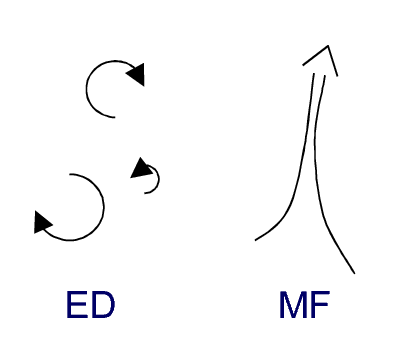DALES-ED(MF)n
Research
Group
|
|
DALES-ED(MF)n |
InScAPE
Research Group |
IntroductionED(MF)n is an Eddy-Diffusivity Mass Flux (EDMF) scheme in which the MF part is formulated in terms of size distributions of plumes. These distributions are resolved using a limited number of size bins, each reconstructed with a rising plume model. This type of convection scheme is also known as a "bin-macrophysics" scheme. Such schemes have the benefit that are inherently scale-aware, and can be made scale-adaptive by size-filtering the reconstructed distribution of plumes. In addition, the use of multiple independent plumes enables internal feedbacks between plume categories, which introduces negative feedback mechanisms that act to stabilize the cumulus-topped boundary layer. This is beneficial for a smooth behavior of the convection schemes, as it quickly acts to reduce any small instabilities. The ED(MF)n scheme has been thoroughly tested for a broad range of large-scale conditions and climate regimes. Apart from commonly used Single Column Model (SCM) simulations, recently the scheme has been tested in an alternative manner, motivated by the arrival of the grey zone problem in convective modeling. The DALES-ED(MF)n scheme stands for the ED(MF)n scheme implemented in the Dutch Atmospheric Large-Eddy Simulation (DALES) code as an operational subgrid scheme. This system for testing evaluating next-generation scale-adaptive convection schemes inside an LES has been developed by the InScAPE research group at the University of Cologne, Germany, and has now been adopted as one of its main research tools. For a detailed scientific description of bin-macrophysics schemes and their scale-adaptivity, and the ED(MF)n scheme in particular, we refer to the papers by Neggers (2015) and Brast et al. (2018). An introductory webpage on EDMF is also provided by the InScAPE research group. |

|